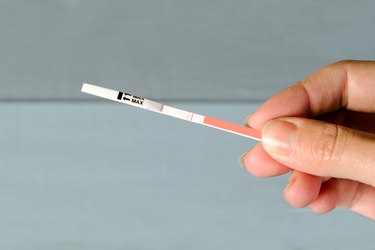
Vitamin C is a water-soluble nutrient not produced by your body. You must consume it fairly regularly, at least in small doses, to avoid any symptoms of deficiency. Eating foods rich in vitamin C or supplementing with it is not known to affect the results of a home pregnancy test, which tests for a specific hormone. Some people believe that mega-dosing vitamin C immediately after discovering that you have conceived will lead to a miscarriage, but this has never been scientifically proven. Consult with your doctor before taking nutritional supplements, especially if you are trying to conceive.
Vitamin C
Video of the Day
Vitamin C, or ascorbic acid, is an essential nutrient that displays strong antioxidant behavior and acts as a mild antimicrobial. Your body needs vitamin C to produce and repair collagen, the elastic compound in connective tissue such as skin, ligaments and cartilage. Vitamin C also stimulates the production and activity of specialized white blood cells of your immune system. Taking large doses of ascorbic acid can increase stomach acidity and affect the pH levels of other tissues, according to "Vitamins, Herbs, Minerals and Supplements: The Complete Guide."
Video of the Day
Pregnancy Tests
A pregnancy test measures levels of human chorionic gonadotropin hormone, or HCG, which is produced by your body when pregnant but also when severely injured or plagued by cancerous tumors, according to "Functional Biochemistry in Health and Disease." If you have just missed your period by a day or so because of pregnancy, there might not be enough HCG in your urine to test positive. Doctors usually advise waiting for a week and then taking a pregnancy test first thing in the morning when your urine is most concentrated. There is no evidence or proposed biochemical theory that vitamin C can interfere with the HCG levels in your urine.
Potential Miscarriage
There is a persistent wives' tale that mega-dosing vitamin C within four weeks of conception can either intentionally or accidentally cause a miscarriage, although no human research has been conducted or published to support this contention, as noted by Miriam Rosenthal, author of "Medical Biochemistry: Human Metabolism in Health and Disease." The dosages often recommended are between 500 and 1,000 milligrams every one to four hours for one to two weeks past the time that you test positive on a pregnancy test. The theory is that pure vitamin C produces an unfavorable climate or pH within your uterus so that the fertilized egg does not implant or cannot maintain its attachment to the uterine wall. As such, mega-dosing vitamin C is viewed by some as a contraceptive or aid for intentional miscarriage or abortion. Attempting to abort a fetus at home is illegal and extremely dangerous. Consult with a doctor before making any decisions regarding your pregnancy.
Cautions
Although scientists and researchers such as Dr. Linus Pauling recommended taking at least 3,000 milligrams of vitamin C daily, there is no proof that you and your unborn child need that much to be healthy. Taking 3,000 milligrams or more of vitamin C daily shouldn't be thought of as dangerous either, because excess is quickly excreted in the urine, although some side effects can occur, such as upset stomach, diarrhea and abdominal pain, according to the "Guide to Nutritional Supplements." High doses of vitamin C do interfere with copper absorption and some medical doctors still warn of the potential of kidney stone formation despite a lack of supporting scientific studies. Regardless, always check with your primary care physician before taking any supplements.